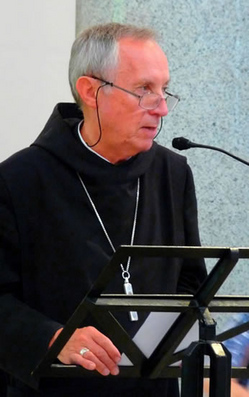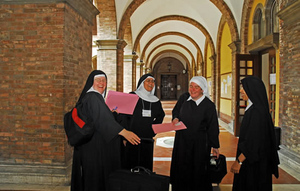This week in
Rome the Communio Internationalis Benedictinarum (CIB) for a congress, their
6th, on “Hope in Benedictine Spirituality.”
Benedictine nuns and sisters
from Europe, Africa and America are attending the meeting. The CIB is meeting
on the Aventine Hill at the Primatial Abbey of Saint Anselm (known in Italian
as Sant’Anselmo), home to the Abbot Primate , Notker Wolf (pictured left) who heads the confederation of
Benedictine monks and nuns, the Pontifical Liturgical Institute, the Mabillion
Institute and the college for theological studies for those preparing for
ordination, earning degrees in theology and monastic studies (the general link for all these institutes for higher learning is here).
Zenit ran an
interview today with Sister Maricarmen Bracamontes de Torreon, a Benedictine
sister from Mexico who talked to aspects of hope and how understanding this
virtue is key in Benedictine spirituality, and thus for all Christians. Sacred
Scripture instructs us to look at how God works with us, that is, He gazes on
us with faithfulness, compassion and mercifully. Looking to the holy Rule,
Saint Benedict tells us “not to despair of God’s mercy” (4.74).
Sister Maricarmen said the participants are keenly aware that there is “only
one Benedictine heart beats at the bottom of our universal diversity, and on
the other, there is no doubt that we are going through a historical moment of
darkness and we need a light, precisely like St. Benedict, which shines on high
and gives us clarity in the midst of darkness.”
Two questions of the interview
are worth thinking about here on the Communio blog:
ZENIT: Can we then speak of
a reflection from a holistic-rational perspective?
Sister Bracamontes: The
Benedictine way leads to a process of integration that embraces the different
dimensions of the human conscience: cognitive (the mind), affective (the
heart), ethics and morals (the will and all its capacities), religious (the
soul).
This integration enables us to love in a unified way and it is the
condition to advance on the path of conversion. “However, the workshop
where we must practice all these things diligently is the enclosure of the
monastery and stability in the community” (Rule of Benedict, 4.78). The
monastic dynamic animates the processes of integration in those who live in the
“monastery,” which is the place where we ask God with the most
insistent prayers to bring to completion the divine work of our lives: that
they all may be one.
If we persevere, trying to live in the
“conversatio,” the experience of God’s unconditional love gradually
integrates all the dimensions of our being, and thus we become unified in
ourselves and in the diversity and plurality that characterizes us. The result
of all this is that we live with transparency and consistency, that we do not
separate our judgments from our feelings, or our conduct from our belief. In
this way, our integrity and social and personal responsibility will not allow
us “to say one thing and do another,” or to establish ourselves in a
life of contradictions and inconsistencies.
ZENIT: At present the Church is
facing difficult moments. Does it call for hope?
Sister Bracamontes: Obviously.
I think that some sectors of the Church have slipped up in the dialogue with
the signs of the times that was so encouraged by the Second Vatican Council.
Those
signs have revealed that for centuries, both in the society as well as the
Church, efforts were dedicated to contain diversity and plurality, so
characteristic of humanity. There are many human groups, with different views
of reality; they are arriving on the first plane and ask that they be
recognized, respected and integrated. The new methods of understanding and of
discovery of humanity leave antiquated the old systems of relationship based on
dominion, submission and marginalization. These systems of the past considered
some human beings superior to others, based on race, gender, social class,
ideology, religion, etc.
In face of a clearer awareness of the common dignity
of all human beings, the absence of dialogue between those who are open to the
signs of the times and those who continue to adhere to visions of the past and
close their mind and heart to the historic change that we are experiencing,
calls for hope.
From a perspective of faith, we are conscious and are convinced
that the whole of humanity, with its differences, has been created with equal
dignity in the divine image and likeness. We are children of God and sisters
and brothers among ourselves in Christ, who is our peace (Ephesians 2:14), and
in him all discrimination and marginalization is overcome (Galatians 3:26-28).
From this awareness we hear the call and we open ourselves with wisdom and
maturity to our world with its urgent need to recognize diversity, to promote
integration and to encourage dialogue and participation. Hence, many challenges
arise.

